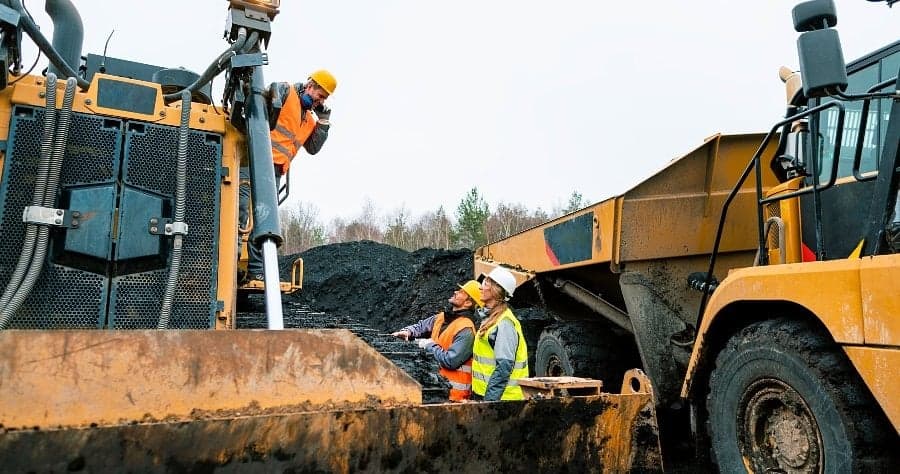In the oil and gas industry, a heavy equipment operator drives or controls large pieces of equipment to assist in construction projects such as building gas and oil pipelines.
The type of equipment involved includes bulldozers, backhoes, cranes and front-end loaders.
Without heavy equipment operators, most pipelines would not exist, making this job extremely relevant. Plus, with older operators retiring, there’s a shortage of these skilled workers.
Thinking about a career as an oilfield equipment operator? Here are the best-paying jobs that are available right now!
Job Outlook and Requirements for Heavy Equipment Operators
Before jumping into the amazing job opportunities as a heavy equipment operator, let’s consider the current job outlook for this position.
Machines like backhoes, loaders and dozers can’t operate themselves but utilize this machinery requires so much more than a warm body in a seat. Operators who are good at their jobs increase productivity and become a valuable asset to the industry.
Operators can learn through on-the-job training but having an apprenticeship program under your belt will increase your chances of landing a high-paying job.
As far as job requirements go, each position is different - some pieces of equipment require a license or certification while a commercial driver’s license (CDL) is often required to haul equipment from site to site.
Now that you understand the high demand for heavy equipment operators, here are the top-paying jobs you should keep an eye on:
Heavy Equipment Operator II
A Heavy Equipment Operator II is a journey-level classification responsible for the operation and care of moderately complex heavy construction equipment in a safe and efficient way.
Heavy construction equipment could be used to construct and maintain roads, bridges and buildings as well as gas and oil pipelines.
The average wage for a Heavy Equipment Operator II is $38,000 but can vary depending on the worker’s specialization.
For instance, in the oil and gas industry, Heavy Equipment Operators can earn an average of $47,000 per year.
Backhoe Operator
Backhoe operators, or excavator operators, use heavy equipment to dig holes, trenches and ditches. They load, scoop and dump heavy materials as well as break rock, back-fill excavations and level slopes.
How to Become a Backhoe Operator: Becoming a backhoe operator requires at least a high school diploma or equivalent as well as the physical capability to handle heavy machinery. There are no official licensing or certification requirements for this position but completing a training program will certainly help you on this career path.
Average Yearly Salary: $54,000
Crane Operator
Crane operators control cranes to lift, move, position or place machinery, equipment and other large objects. This equipment involves the use of buttons, levers and pedals to attach loads to hoists as well as safely remove them.
How to Become a Crane Operator: Some areas require certification in order to become a crane operator, which usually involves a 1-3 year apprenticeship program as well as on-the-job training, technical training and exams - after which you are awarded a journeyman certificate.
Average Yearly Salary: $51,000
Front-End Loader Operator
Front-end loader, or power shovel, operators operate heavy equipment with movable arms and tilting buckets. They pick up heavy loads of substance such as earth, gravel and sand and dump these materials into piles, excavations or trucks.
How to Become a Front-End Loader Operator: You can become a front-end loader operator with a high school diploma or GED but it is possible to obtain formal education for this position by completing a certification course and applying for an apprenticeship program.
Average Yearly Salary: $32,000
Bulldozer Operator
Bulldozer operators operate crawler-tractors equipped with large front blades to push obstacles such as dirt, sand, rock and gravel as well as other equipment. They are also equipped with back rippers to tear up terrain.
How to Become a Bulldozer Operator: A high school diploma or equivalent is the basic education required to be a bulldozer operator. However, additional education such as courses in math and auto mechanics may be required by certain employers.
Average Yearly Salary: $27,000
Heavy Equipment Operator III
Those with a Heavy Equipment Operator III classification perform highly complex and difficult activities by operating a variety of heavy equipment.
These positions include supervisory responsibilities such as directing the work of other laborers and equipment operators to ensure tasks are performed safely and timely.
A Heavy Equipment Operator Supervisor is responsible for supervising, coordinating and scheduling the activities of workers who operate heavy equipment.
Expectations also include maintaining comprehensive records, assembling reports, ensuring routine maintenance and assisting in the hiring and training of new employees.
How to Become a Heavy Equipment Operator Supervisor: For this position, completion of high school is required along with, typically, 3 years experience at the Heavy Equipment Operator II level.
Average Yearly Salary: $64,000
Job Opportunities
Check out our job listings for current opportunities as a heavy equipment operator in the oil and gas industry!

